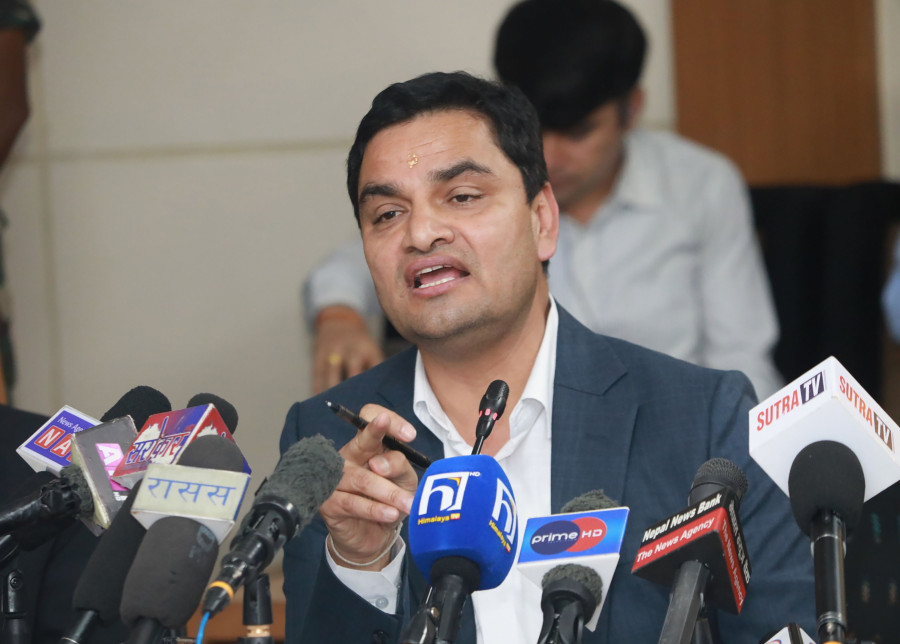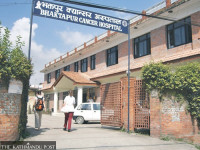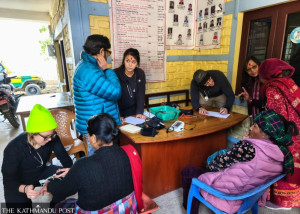Health
Health minister cites routine activities as achievements
Instead of focussing on public access to health care and effective service delivery, Minister Paudel announces several free programmes as achievements, without ensuring resources to implement them, experts say.
Post Report
Minister for Health and Population Pradip Paudel on Monday held a press meet to tout achievements of his year-long tenure. He shared a long list of accomplishments but it included almost all routine programmes.
The claimed achievements included the decision to foster coordination among agencies concerned under three tiers of governments, activate public health committees, hold discussions and carry out studies with stakeholders regarding health related laws, structures and management of human resources, planning and infrastructure development.
Paudel's media briefing resembled a budget speech, as he read out almost all the programmes mentioned in the fiscal budget.
However, Paudel gave vague answers when mediapersons questioned why patients have continued to face hardships at state-run health facilities, what had happened of his declaration to end long waiting lines at public hospitals within a month of his appointment and of his pledge to raise the coverage of the government’s health insurance scheme to Rs500,000 soon.
“What would patients and their relatives wandering in the premises of Bir Hospital and the National Trauma Center or in Kanti Children’s Hospital think if they are watching or listening to your claims?” questioned a media person.
“I didn’t know so many things could have been done in a year,” another reporter remarked, sarcastically. “There may not be any problems in Nepal’s health care sector.”
When the third media person asked about the status of a circular he issued to agencies to implement the Cabinet decision of running outpatient care on public holidays, repeated halt in health care services by doctors and the ministry’s apparent helplessness, the minister himself appeared unsure of the so many achievements that he claimed to have made in just one year.
Media persons further quizzed the minister about the lack of free essential medicines in state-run health facilities including iron folic acid, and birth control shots Depo-Provera, among others. Secretary for the health ministry Dr Bikash Devkota claimed that an agreement had been reached with an aid agency for purchase of iron folic acid and it would take six weeks to have it delivered.
However, officials at the Management Division of the Department of Health Services said that they are unaware of any such agreement.
“The government has allocated a budget to procure iron folic acid in the ongoing fiscal year and we have started the process,” said Dr Pawan Jung Rayamajhi, director of the division. “Along with iron folic acid, we will also purchase family planning consumables including Depo-Provera.”
Due to a lack of iron folic acid in the state-run health facilities, hundreds of thousands of pregnant women, new mothers, and girls between 10 and 19 have been deprived of free iron and folic acid for months.
The disruption has raised concerns about the government’s failure to ensure continuous supply of the supplements critical to preventing anaemia.
Along with iron folic acid tablets, health facilities in many districts lack family planning consumables including Depo-Provera, a widely used contraceptive in Nepal that has the hormone progestin, which often stops the ovaries from releasing eggs, meaning that there is no ovulation.
Experts warn that a lack of those birth control shots for prolonged periods risks a rise in unintended pregnancies.
“Instead of focussing on public access to health care and effective service delivery, this minister has announced free programmes, which is neither possible from the existing budget and capacity of the country,” said Dr Shyam Raj Upreti, former director at the Department of Health Services. “It seems that he is hungry of taking credits even of the regular programmes and programmes started in other minister’s tenure.”
Experts say if the minister had consulted with experts, he would have been better advised about existing challenges, and would have stopped announcing populist programmes whose implementation is impossible due to limitations of resources.




 10.12°C Kathmandu
10.12°C Kathmandu













